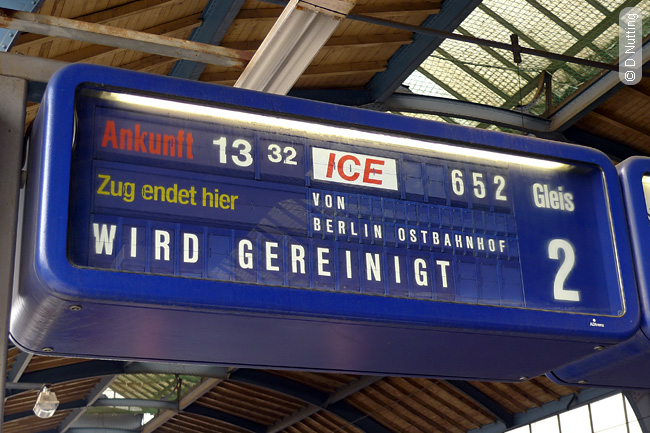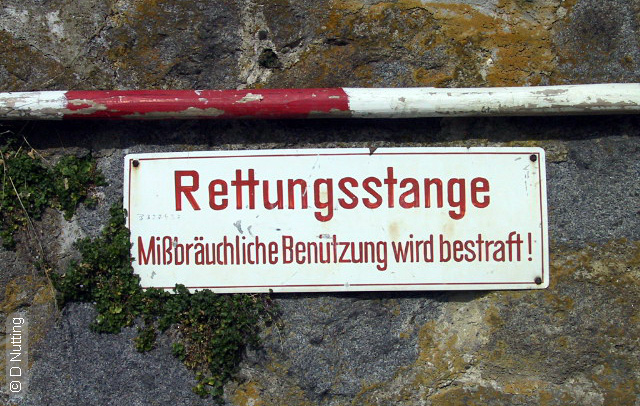Verbs: the Passive
| What is it? | Why? | How to:
Present Tense | How to: Imperfect Tense
| How to: Perfect Tense | Other
Options |
| Things to Watch Out For | the practice exercises |

"Tobogganers and pedestrians are not transported." (Switzerland)
What do we mean by "the Passive"?
In a sentence that contains a "passive" verb construction, the subject
of the verb isn't doing anything itself. Something is being done to it.
In a sentence that uses the "active" verb construction, the subject
is doing something - it's actively doing the verb action. See these examples
in English:
= Subject (Nominative case) :: = Object (Accusative case)
"ACTIVE" SENTENCE: Roger Federer is beating Lleyton Hewitt at the moment .
"PASSIVE" SENTENCE: Lleyton Hewitt is being/is getting beaten by Roger Federer at the moment.
Notice that the object in the active sentence has become the subject of the passive sentence.
Why do we use the Passive?
The passive is often used in order to focus the reader's or listener's attention
on the thing/person which something is being/getting done to.
Sometimes it is used in order to avoid mentioning by whom it was done .
e.g. Lleyton Hewitt is being/is getting beaten. (You can leave out "by whom")
In the media/journalism the passive is often used by reporters when they are not allowed by law to mention yet by whom something was done, or when they simply don't know yet by whom something was done, because the passive allows you to leave out by whom if you want to.
e.g. The bank in High St. was/got robbed last night.
How to use the Passive
The passive is formed/used by using the verb WERDEN (in whichever tense is
appropriate, e.g. present, perfect etc.), and the participle of the other relevant
verb.
You can check the participle of strong verbs in the Strong
Verb List. If not in the list, it's a weak verb, works like machen = gemacht.
Present Tense
| ich werde... du wirst... er/sie/es wird... wir werden... ihr werdet... sie/Sie werden... |
+ participle (e.g. gemacht) |
e.g. ACTIVE: Die Mutter macht den Hochzeitskuchen (The
mother makes/is making the wedding cake)
machen ![]() participle = gemacht
participle = gemacht
PASSIVE: Der Hochzeitskuchen wird von der Mutter gemacht. (The
wedding cake is being/is getting made by the mother)
e.g. ACTIVE: Die Hawthorn-Fußballspieler (plural) feiern einen großen Sieg! (The Hawthorn footballers are celebrating a
great victory!)
feiern (to celebrate) ![]() participle = gefeiert
participle = gefeiert
PASSIVE: Ein großer Sieg wird von den (plural) Hawthorn-Fußballspielern gefeiert! (A great victory
is being celebrated by the Hawthorn players!)
In German, the by in the passive is expressed with von + DATIVE, if it is by a person/people
e.g.
| gender |
m (der) |
f (die) |
nt (das) |
plural |
|---|---|---|---|---|
| von | einem | einer | einem | _ _ _ |
| von | dem | der | dem | den |
If it is done by an inanimate thing (e.g., by the weather, by a computer),
then the by is expressed by durch + ACCUSATIVE
e.g.
| gender |
m (der) |
f (die) |
nt (das) |
plural |
|---|---|---|---|---|
| durch | einen | eine | ein | _ _ _ |
| durch | den | die | das | die |

"In strong winds operation [of the cable-car] is [gets] suspended." (Switzerland)

The train is being cleaned.
Remember that in the Passive you can leave out by whom something will be done, as in the official sign below, on a river bank in the city of Passau, Germany:

Passau lies
on the confluence of three rivers: the Donau, the Inn and the Ilz.
If you saw someone fall into the river you'd grab one of these rescue poles first! ("Misuse gets [will be] punished.")
Present Tense exercises (D Nutting)